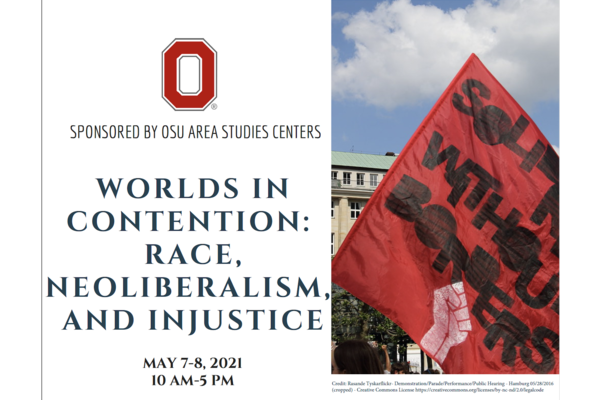Latin America features prominently at Worlds in Contention Conference

On May 7-8, 2021, OSU's Center for Latin American Studies (CLAS), Center for Slavic, East European, & Eurasian Studies, East Asian Studies Center, and Department of Political Science partnered to host Worlds in Contention: Race, Neoliberalism, & Injustice. The virtual conference brought together an interdisciplinary body of scholars with expertise on capitalism and neoliberalism around the world, with special emphasis on how these systems affect and are challenged by racialized groups.
Through their Title VI grants from the US Department of Education, OSU's three Area Studies Centers with National Resource Center designation sponsored honoraria for invited speakers with expertise in each of their respective regions. CLAS was proud to support the following scholars, whose presentations addressed topics ranging from land disputes and sociopolitical tensions in Colombia, to the impact on indigenous women of resource extraction in Mexico, to the complex future of green technologies across Latin America, to government framings of and responses to the COVID pandemic in Mexico:
- Isabel Altamirano-Jimenez (University of Alberta), “Refusing the Violence of Resource Extraction in the Isthmus of Tehuantepec”
- Alishia Gálvez (CUNY), “COVID Clarifies: How the pandemic revealed the neoliberal logic underlying our transnational food and health systems"
- Thea Riofrancos (Providence College), “The Endless Frontier: Green Technologies, Geopolitics, and Planetary Extraction”
- Amy Offner (University of Pennsylvania), “Claiming Resources, Claiming Concepts: Ethnic Formation and State Formation in Colombia’s Cauca Valley”
(Abstracts for these talks, as well as those sponsored by the Center for Slavic, East European, & Eurasian Studies and the East Asian Studies Center, are available here).
The Area Studies Centers also supported OSU graduate students through a conference fellowship program. Select graduate students who attended the conference wrote short reflections connecting the work of the guest speakers and relating the conference content to their own research agendas. Reflections relating to Latin America include:
-
Steven Rhue (Dept. of Anthropology, CLAS Tinker Fellow), "Water, Struggle, and History," which discusses Offner and Altamirano-Jiménez's presentations and connects them to Rhue's own work on urban Brazilian children's experiences with household water insecurity.
-
Andrew Mitchel (Dept. of Anthropology), "Food, Neoliberalism, & Social Control," which establishes connections between two of the conference panels ("Legal Subjection and Racial Capitalism" and "Violence at the Frontiers of Nature and the Domestic") and Michel's own thesis research on what he calls the "Latinx immigrant foodscape" for Oaxacan immigrants in Columbus.
-
Dominic Pfister (Dept. of Political Science), "Materiality of Phenomena," in which Gálvez' analysis of Mexican governmental messaging about COVID-19 comorbidities informs Pfister's investigations of the interconnection between security and health, while Riofrancos' study encourages the consideration of the political importance of materiality.
-
Ayodeji Richard Olugbuyiro (Dept. of Spanish & Portuguese), "Labor Exploitation and Neoliberal Hegemonic Power Structures," which draws connections between Drs. Inés Valdez and Cameron Skye Macaskill's presentations on the exploitation of Black and Brown laborers in Africa and the US and Olugbuyiro's own scholarship on Afro-Brazilian and Afro-Latin cultures.
(Read more graduate student reflections sponsored by the OSU Area Studies Centers here.)
